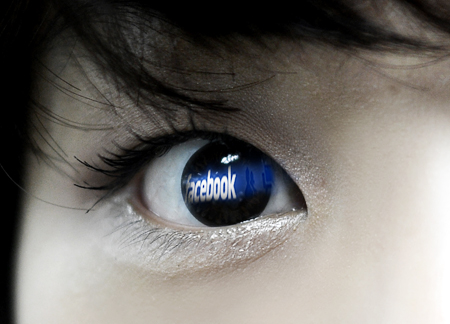Choi Moon-jung, a 28-year-old office worker updates her Facebook account frequently. Her Facebook page is filled with pictures and written posts, along with her personal information about her education, hobbies and relationship status.
Although she had been aware of the fact that her information was readily available on the website, she had paid little attention to risks endangering her privacy until she recently received a message from a stranger.
“It was a message that asked me to check out updated pictures of someone I did not know. I ignored it, but the weird thing is that it was sent to my company’s e-mail account, which I hadn’t posted on my Facebook profile section,” Choi said. “It seems that the person went further, digging for details using the information that was posted on my page. It was really creepy, like someone was spying on me or something.”
From then onwards, she started exercising caution over posting private details online. Choi expressed concern over people possibly using personal information for the wrong purpose pointing out that Facebook spying can easily be done simply by entering an e-mail address or a name in the site’s search engine.
Facebook spying, oblivious users
WikiLeaks founder Julian Assange described Facebook as “the most appalling spy machine that has ever been invented,” warning over 900 million users worldwide about the dangers of privacy exposure through it.
Speaking to a Russian news network Russia Today last year, Assange said “Here we have the world’s most comprehensive database about people, their relationships, their names, their addresses, their locations and their communications with each other their relatives, all sitting within the United States, all accessible to U.S. intelligence.” Assange’s concern is that the U.S. government monitors Facebook and other social media such as Twitter to observe the behavior and thoughts of societies around the world. Some people argue that Assange is paranoid. However, the Associated Press last year reported the existence of the Central Intelligence Agency’s “Open Source Center” which has a team dedicated to compiling information from Facebook and other media. According to the AP story, analysis from the center is regularly included in President Barack Obama’s daily intelligence briefing.
Kim Min-hee, a 22-year-old college student living in Seoul starts her day by checking her Facebook wall. She checks all the new comments and replies to each and every one that her friends have posted on her photos, status and check-ins. She also makes sure that she checks how many “Like-it” buttons were hit by her friends during the night.
On the subway on her way to the school, she bumped into one of her classmates. She pulled out her smartphone and tapped the Facebook application to immediately upload a new status, tagging her friend: what a surprise! I just met a friend of mine on my way to school! YAY! – with Kim Jung-min.
During class that morning, she got bored and pulled out her smartphone and posted another status: “HUNGRY! Thinking of what I’m going to have for lunch 😉 ― at room 305 in the humanity building.”
After her morning class was finally over, Kim headed to a pizzeria to have lunch with her friends. When the food was served, she pulled out her smartphone yet again and took pictures of the food and uploaded them on her Facebook page.
For Kim, Facebook has become an indispensable part of her life. From morning till night, she posts just about everything on the wall of the blue page, and not surprisingly, about 300 of her friends can see Kim’s every move, whether willingly or not.
But trivial or fancy, posts containing locations including names of restaurants, and information about who someone was with can make it incredibly easy to track somebody down. If anybody were to have ill intentions, they would have more than enough references they have to their disposal.
Facebook psychology
Then why is it that people post all these details?
“When people check in or post pictures of fancy restaurants or hotels, I guess they do it ‘cause they want to show off,” says Park Seung-hee, a 21-year-old working for a publishing company in Seoul. “A lot of people care about what others think of them, you know.”
“But on the other hand, I often post trivial details about my daily life. Take my posting of last night for example. I grabbed a beer with my friends at a convenience store in my neighborhood. I took a picture of the outdoor table at the store and posted with a short text that I was drinking. It’s nothing but my diary.”
Park said she uses the site to keep a record of her daily life and keep memories. “Wouldn’t it be nice if I could stir memories through my postings?” Park said.
Although a plethora of research drew different conclusions about the causes of Facebook obsession, many seem to agree that there is an obsession of some kind.
In a study published in the journal Cyberpsychology, Behavior, and Social Networking, Mauri et al. (2011) discovered that the consistent pattern of biological signals while using Facebook arouses a psycho-physiological state that is different from the conditions of being relaxed and stressed.
According to the research, the biological signals are in concert with “Core Flow State,” which is described by “high positive valence and high arousal.” People in such a condition are in a state of high stimulation and are enjoying what they are doing. With respect to people who use Facebook repeatedly, it explains why people keep updating their status and making comments. And there are plenty of examples around.
Perils of SNS
Social networking sites, as great as they are, pose various threats to heavy users. But while a lot of attention has been given to SNS addiction or obsession, not so much has been given to the dangers of potential abuse of readily available information on these sites.
Nicole Williams, career expert and connection director of the U.S.-based social networking website LinkedIn, shares tips on how to stay safe on social networks in an article for Seventeen, an American magazine for teenagers.
The first step to ensure safety on social networking sites is to be cautious about who you ‘friend’. It just requires a simple check on whether you know the people sending you friend requests. “People think it’s a popularity contest ― who can have the most friends ― and it’s not,” Williams was quoted as saying in the article.
The next important tip is to keep your information private, especially your phone number and address. Information on profiles includes everything from your alma mater, workplace, city of residence, blood type, political and religious views. One can either choose to leave those columns blank or change the settings so that only your closest friends can view these details.
Another point to keep in mind is to be discreet about your location. “Checking in” on Facebook is a popular way to let everyone know what you’re up to, but it could be dangerous when in the wrong hands. Williams in particular advises not to post specifics of where you go on vacation, such as hotel details. Posting your class schedules is also not a good idea, according to the connection director.
Connecting and communicating online has become an integral part of life today, but it bears with it potential harm. <The Korea Times/Kim Bo-eun, Bahk Eun-ji, Jung Min-ho>






